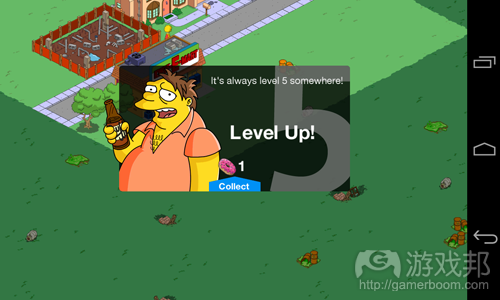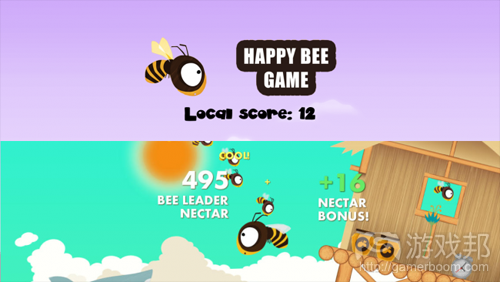每日观察:关注《Flappy Bird》移除原因及克隆现象(2.12)
1)据pocketgamer报道,柏林休闲游戏工作室GameDuell日前宣布前PopCap工作室总监Todd English将加入公司,担任社交及手机游戏主管,将负责领导面向Facebook和移动平台的所有游戏开发和产品团队。
2)据福布斯报道,针对时下热门游戏《Flappy Bird》为何从App Store和Google Play移除一事,该游戏开发者dong Nguyen在最近采访中透露了原因,表示自己并不是因为成功所带来的心理压力而移除游戏,而是因为良心发现,他认为该游戏的设计初衷是让人们消遣片刻,但结果却发现它成了令人上瘾的产品,所以这是一个大问题,而最好的解决方法就是移除游戏。
观察者指出,在这样一个多数开发者都致力于令游戏更具成瘾性的世界中,Nguyen坚持个人原则的这一举动无疑令人印象深刻。但他同时也承认,游戏走红后自己的生活就无法像之前那样平静和舒适了,并因此常常无法入眠。
Nguyen并没有打算离开游戏开发领域,他目前还有另外两款游戏跻身热门榜单前10名,它们分别是《Super Ball Juggling》和《Shunken Block》。
3)游戏调研机构NPD Group最新报告显示,2013年美国消费者对游戏相关内容的投入达153.9亿美元,比2012年增长1%。其中数字内容占据半数比例,并且也是唯一呈现快速发展趋势的领域。
玩家在新款实体零售游戏中的投入是63.4亿美元,比2012年下降11%。但这并不是因为玩家收紧口袋,而是因为他们转向了数字内容消费领域。完整的游戏下载、订阅、手机、社交和扩展内容销售额为72.2亿美元,二手及租赁游戏收益则是18.3亿美元。
报告还指出,36%年龄不低于13岁的美国人是数字游戏玩家,其中的主力军是青少人和年轻人群体。
4)据venturebeat报道,律师事务所Osborne Clark的虚拟商品法务专家Paul Gardner日前表示,由于虚拟商品滥用现象已经引起关注,未来虚拟商品的购买规范和管制程度将进一步加强。
在2013年初,有名男孩就在EA手机游戏《The Simpsons: Tapped Out》中花掉了父母银行帐户中的1000英磅(约1650美元),虽然其家长已经获得了退款,但社会上的类似事件却是有增无减,为保护儿童及家长的权益,滥用虚拟商品的现象在多个市场受到了政府干预。
英国公平贸易委员会在2012年4月对这一行业展开了调查,审查了38款儿童网络和应用游戏,并于9月份颁布了游戏应该遵守的8项原则,并于今年1月发布了最终报告 ,并将于4月1日开始执行相关规定。
这些规定指出,开发者应该向消费者明确支付情况,提供查询和投诉的联系方式,并且要明确玩法内容与付费内容之间的区别。游戏不应该针对儿童用户年幼无知、易被怂恿等特点来推销虚拟商品。此外如果没有支付帐号户主本人的授权,游戏就不应该确认支付情况。
除了英国之外,德国政府也采取措施制裁了运营《Runes of Magic》的公司GameForge,原因是后者过份怂恿人们购买盔甲和武器。美国联邦贸易委员会也在不久前向苹果施压,迫使该公司向某些受害消费者退款3250万美元。
5)据gamezebo报道,就在Dong Ngyuen本周初将《Flappy Bird》移除之后,苹果App Store最近就出现了一款玩法与之相似,并且攀向了热门榜单第3名的克隆游戏《Flappy Bee》。
观察者指出,这款游戏不但玩法与《Flappy Bird》相似,其游戏设计甚至还盗用了另一款游戏《Bee Leader》中的资产。
《Bee Leader》开发商Flightless创意总裁John O’Reilly注意到了这种情况,表示作为小型独立游戏工作室他们对此感到很遗憾和无能为力,并向苹果提交了相关说明,但截止本文撰稿,《Flappy Bee》仍然稳居Ap Store榜单。
更令人惊讶的是,《Flappy Bee》这一游戏中并未出现《Bee Leader》中的小蜜峰角色,但在游戏图标、游戏菜单却出现了这一设计。其真正游戏玩法中的角色则是一只设计更为粗糙的小蜜蜂。(本文为游戏邦/gamerboom.com编译,拒绝任何不保留版权的转载,如需转载请联系:游戏邦)
1)Former PopCap studio director Todd English joins GameDuell
by Chris Kerr
GameDuell has announced that former PopCap studio director, Todd English, will be joining the firm as the head of studio social and mobile games.
The Berlin-based causal games outfit has hired English in a bid to strengthen its “accelerated move into the growing market of new games platforms”.
English, who has over a decade of development experience under his belt, will lead the development and product teams working on all Facebook and mobile games.(source:pocketgamer)
2)The real reason Flappy Bird is gone: you wouldn’t stop playing it
By Jim Squires
There has been a lot of speculation about why Flappy Bird was removed from the App Store and Google Play by its creator on Sunday. At the time, we were left with some cryptic tweets that led many to believe the game’s success had given him a nervous breakdown.
But in his first interview since removing the game, Dong Nguyen reveals his true motivations for killing the Bird. It wasn’t a mental health breakdown – it was a crisis of conscience.
“Flappy Bird was designed to play in a few minutes when you are relaxed,” Nguyen told Forbes. “But it happened to become an addictive product. I think it has become a problem. To solve that problem, it’s best to take down Flappy Bird. It’s gone forever.”
In a world where most developers are trying to figure out how to make their games more addictive, Nguyen finds himself swimming upstream like a salmon. Whether you agree with his decision or not, you’ve got to be impressed by a man who lives by his principles to that degree.
Still, that’s not to say the stress of his instant fame wasn’t at least a partial factor in his decision. Nguyen told Forbes that “my life has not been as comfortable as I was before… I couldn’t sleep.”
True to his word, though, Nguyen isn’t planning on leaving the game development scene. He has two other games in the top 10 right now – Super Ball Juggling and Shuriken Block – and plans to leave them available for download… unless he believes players are showing addictive behaviors towards them too.
If you’re yearning for a Flappy Bird replacement, Nguyen has said that he’s played Ironpants, and calls it “a good game.”
I’ve played Ironpants too, and if you ask me, that’s the craziest thing he’s said yet.(source:gamezebo)
3)Game-related content generated $15.39B in U.S. last year
Jeffrey Grubb
Digital, physical, or used — gamers don’t care. If it’s games, they will spend money on it.
U.S. consumers spent $15.39 billion on game-related content in 2013, according to industry research firm The NPD Group. That’s up 1 percent over 2012. Digital made up nearly half of all that spending, and it was also the only sector showing major growth.
Gamers spent $6.34 billion on new physical titles at retail. That is down 11 percent from 2012. It doesn’t appear that consumers didn’t spend that money. Instead, they seemed to spend it on digital content. Full-game downloads, subscriptions, mobile, social, and expansion content generated $7.22 billion in sales. Used and rental games brought in $1.83 billion in revenue.
“Growth in digitally distributed content is vital to overall industry health,” NPD analyst Liam Callahan said. “Since this is such a topic of high interest to the industry, we recently conducted additional in-depth research into consumer behavior with regard to digital content acquisition, and [we] found that 36 percent of the U.S. population ages 13 and older are playing games acquired digitally, with incidence highest among teens and young adults. Interestingly, however, there is no particular point after age 25 where incidence declines significantly.”
That means the digital future is already here. Mobile markets like Google Play and the iOS App Store are bringing in tons of cash, but so is Valve’s digital-retail service Steam.
Additionally, the new consoles from Microsoft, Sony, and Nintendo are all much more focused on digital distribution. Virtually all major releases hit brick-and-mortar stores on the same day that the games go on sale on Xbox One’s Game Store, Sony’s PlayStation Network, or the Nintendo eShop.
Microsoft and Sony both launched their new consoles in November. Nintendo’s Wii U and 3DS as well as Sony’s PlayStation Vita all already generate much of their sales digitally. But 2014 is the first time we’ll have all consoles on sale throughout the entire year.
“The bottom line is that the overall games market is growing,” said Callahan. “NPD reported declines in content and hardware spending in both 2011 and 2012, so the growth in 2013 is a positive indicator for future market growth as we enter the first full year with all three new consoles on the market.”(source:venturebeat)
4)Game makers beware: Virtual goods purchases are about to be regulated
Dean Takahashi
Disclosure: The Dutch government paid my way to Amsterdam, where I moderated a session. My coverage remains objective.
AMSTERDAM — The free ride for overly aggressive virtual goods schemes is coming to an end.
Because of abuses that regulators view as excessive, virtual goods purchases are going to be increasingly regulated in the future, according to virtual goods legal expert Paul Gardner of the Osborne Clark law firm.
Virtual goods have become a multibillion-dollar money maker for game companies, but they have a downside for consumers. One boy found that out when he drained his parents’ bank account, spending £1,000 (about $1,650) on virtual donuts in Electronic Arts’ The Simpsons: Tapped Out game in the spring of 2013. The boy’s parents were refunded, but incidents like that are increasingly common, and regulators are acting to protect both children and parents from aggressive tactics.
“They have found that some games include potentially unfair and overly aggressive commercial practices,” Gardner said in a talk at Casual Connect Europe in Amsterdam.
The United Kingdom Office of Fair Trading started an investigation in April 2012. It reviewed 38 children’s web and app-based games. In September, it drafted eight principles that games should abide by. It published a final report in January and will begin enforcement of its regulations April 1.
The regulations are based on interpretations of existing UK law, and they are consistent with European Union laws as well. The agency is urging its counterparts in the European Union and elsewhere to adopt similar protections for consumers.
During its investigation, the UK agency found a lack of transparent, accurate, and clear upfront information about costs. You might find, for instance, when you hit level 11 of a game that you have to make an in-app purchase in order to proceed. The games also didn’t always include clear distinctions between in-game currency and real-money currency. And in many games, children were directly incited through in-game statements or images to make a purchase. One game, for instance, urged the player to feed a seagull without clearly saying that the food was a paid virtual good.
Peter Molyneux, head of 22cans and a veteran game developer, said it was “shameful” that some developers were exploiting users in this way.
In its enforcement principles, the agency says developers should be clear about costs, should provide their contact information for queries and complaints, and should be clear about the difference between gameplay content and paid content in a game. The games should also not target a child’s inherent inexperience, vulnerability, or credulity with sales pitches for virtual goods. Payments should also not be made without the authorization of the payment account holder, or parent.
The issue isn’t just a problem in the UK. In Germany, regulators took action against GameForge, whose Runes of Magic game aggressively urged people to purchase armor and weapons. The Federal Trade Commission in the U.S. also forced Apple to refund $32.5 million to consumers for violations of policies against exploiting children.
In June 2012, the European Commission did a study of digital content in freemium apps, and it issued a report in October. The aim was to look at the disproportionate and unexpected charges resulting from in-game purchases by children. The issue of data privacy and online gambling is also a matter for investigation in a variety of venues, and virtual goods play a role in both of those areas.
The burden of enforcing measures is now shifting to publishers and platform owners like Apple. Developers also have to look to the rights of consumers when a game is shut down. Should users get refunds for the goods they purchased? Do you give them some kind of in-kind goods in another game?
“There will be increasing pressure from consumer protection laws,” Gardner said. “And it’s not based on new laws, but existing laws. You have to think about it when designing a game.
Ask yourself what is fair and reasonable.”(source:venturebeat)
5)The #3 game on the App Store is using stolen assets
By Jim Squires
When Flappy Bird creator Dong Ngyuen pulled the game from sale earlier this week, the race was on to see which clone would replace its ‘inspiration’ and take the throne in the #1 slot. After all, nature abhors a vacuum. That’s probably why the top three games on the App Store right now all look and play somewhat similar to Flappy Bird.
And the game in third place? It looks awfully familiar. And I think I know why.
We’ve all somehow accepted that game concepts are going to be copied on the App Store – especially when they’re proven to work. And to a certain degree, you’ve got to wonder where the line between “copycat” and “inspired by” can really be drawn. I’ve made the argument before that if we didn’t allow similar games, first-person shooters would have stopped at Wolfenstein 3-D. Platformers would have stopped at Super Mario Bros. So on some weird level, we can forgive Flappy Bee for being a slimy “me too” entry in the race to mimic Flappy Bird.
Top: Flappy Bee, Bottom: Bee Leader
What we can’t forgive, however, is using somebody else’s assets without their permission. And the bee in Flappy Bee’s marketing? It would be hard to deny that it’s also the bee from Bee Leader. I see it. You see it. And the developer of Bee Leader, Flightless, definitely sees it.
“We’re considering our legal position at the moment,” said John O’Reilly, Flightless’ Creative Director. “[Flappy Bee is] using copyrighted assets that have been
directly stolen from Bee Leader… We’re gutted and feel powerless as a small indie games company to see our hard work taken advantage of in this way.”
Flightless has filed a content dispute with Apple, but as of this writing, Flappy Bee remains live on the App Store “gathering significant ad network revenue for its rogue developer, all while usingour work,” says O’Reilly. “It’s been a rough day.”
If you’re looking for further evidence of to support Flightless’ claims, we present Exhibit B: the icons for the two games. Or, more to the point, the icon for Bee Leader that is clearly being used on both games.
What’s even crazier though is that Flappy Bee isn’t using Flightless’ bee in-game. You’ll see it on the game menu, you’ll see it on the icon – but once you start playing, Flappy Bee uses a much cruder bee than the one they’ve “borrowed” as their mascot. It’s somewhat baffling.
If you’re going to steal, you should probably go all in, right?(source:gamezebo)











































